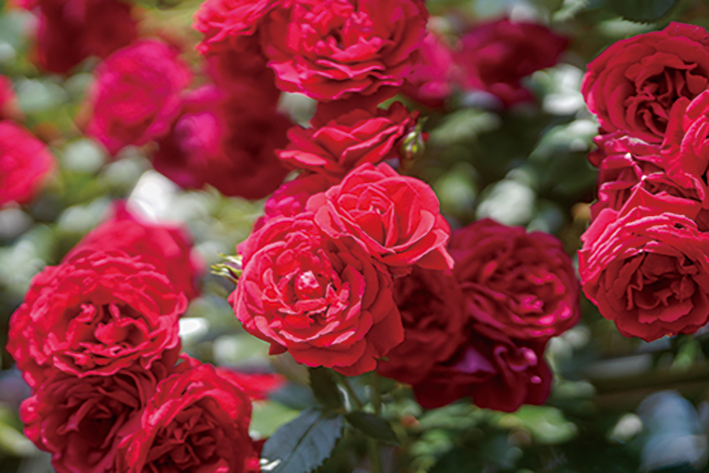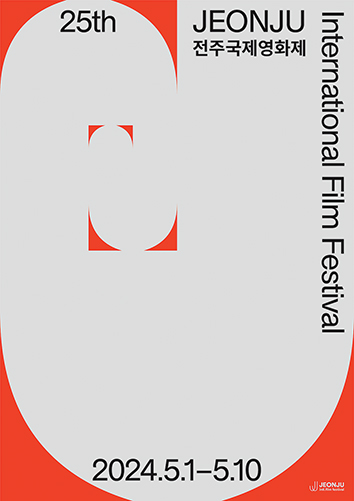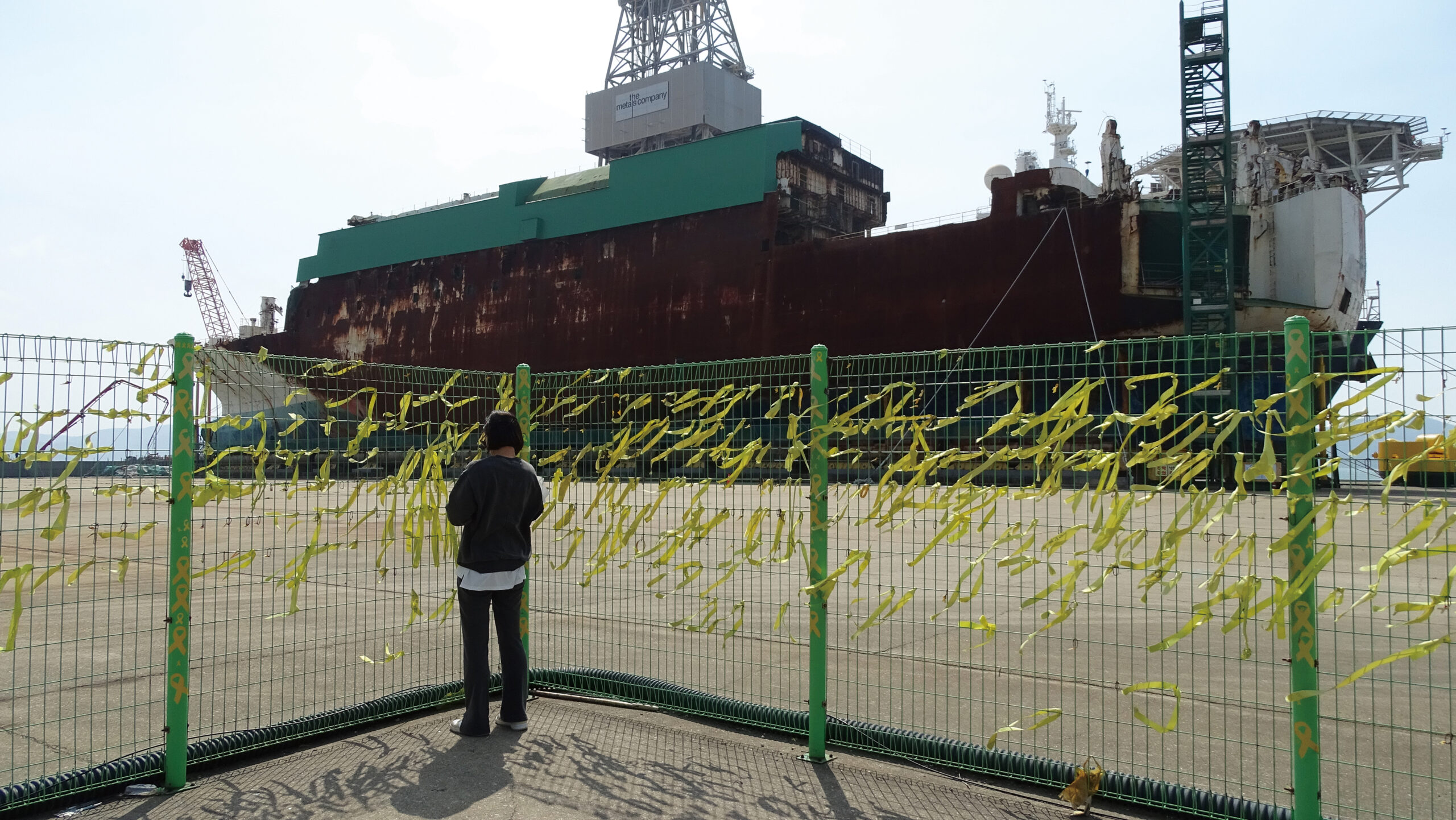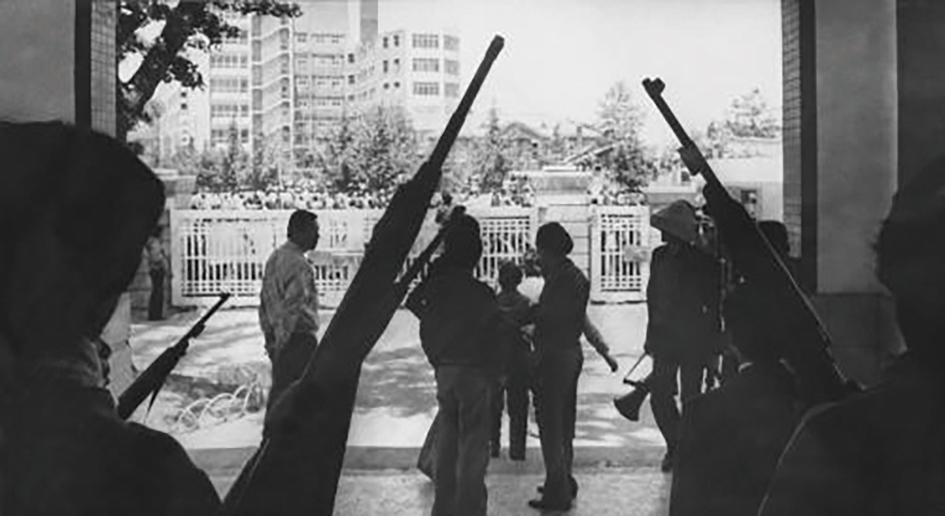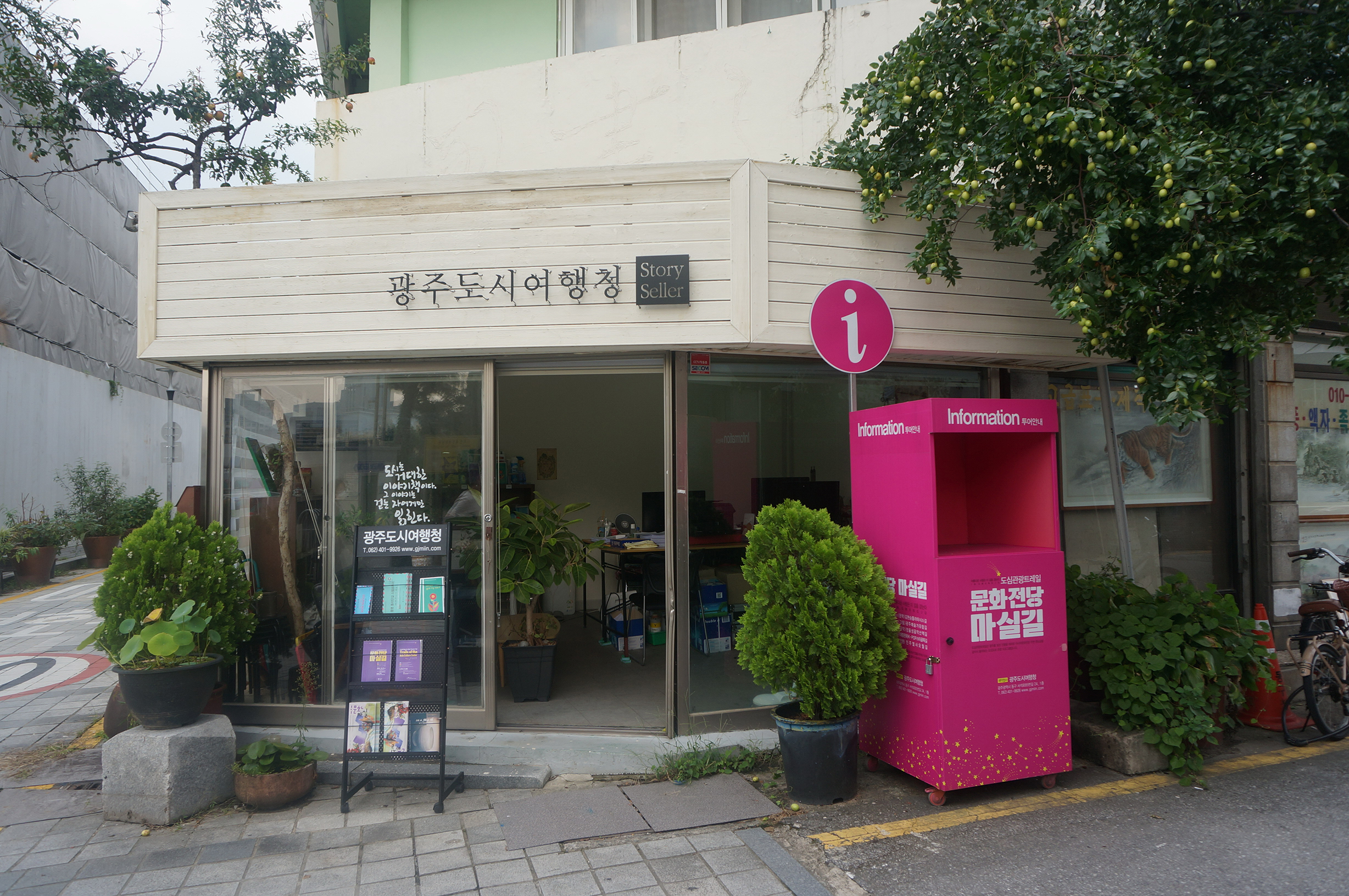Gwangju’s Urban Tourism Trail Project
Interview with Hyunhee Cho
Interviews by Jeong Jiyeon and William Urbanski.
In an effort to expand Gwangju’s tourism options, Gwangju City, through the Gwangju Urban Tourism Agency, has embarked on a remarkable project of creating short tours within the city limits to pique interest in the city, its history, and its culture and arts. To bring you the details of the tourism trail project, the Gwangju News met up with the head of the Gwangju Urban Tour Agency, Cho Hyunhee, for the following interview. — Ed.
Gwangju News (GN): To begin with, please briefly introduce yourself and the Gwangju Urban Tour Agency.
Cho Hyunhee: My name is Cho Hyunhee, and I am the representative of the Gwangju Urban Tour Agency. The Gwangju Urban Tour Agency creates and operates seven tours inspired by hidden touristic treasures in the city of Gwangju. The contents our agency creates are mainly made for tourists and Gwangju citizens.
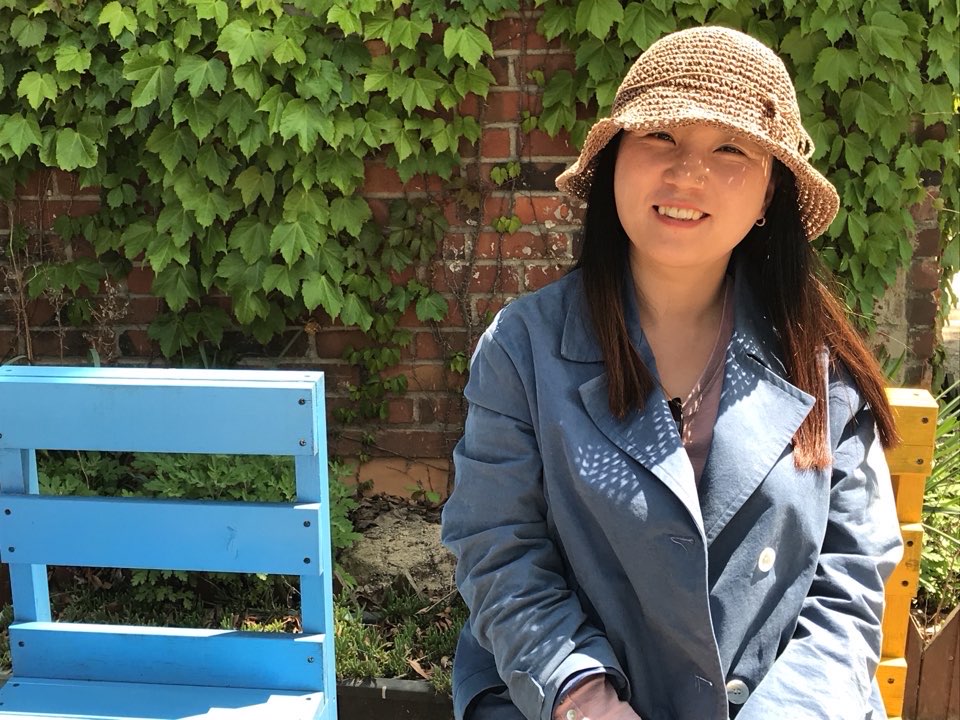
GN: Could you tell us something about the main projects of the agency?
Cho Hyunhee: Certainly. Currently, our main project is the Urban Tourism Trails, which allows tourists to walk around the old downtown area surrounding the Asia Culture Center. Also, this year we are conducting a K-pop dance-cover experience tour where visitors can try and learn K-pop dance routines in the K-pop Idol Alley set up in the backstreet area of the former Student Memorial Hall just off Chungjang-ro [Gwangju’s “walking street”].
GN: What was the idea behind creating the K-pop Idol Alley, and what plans do you have in store for its future?
Cho Hyunhee: As you know, Gwangju has not been known for an abundance of tourist attractions. Nevertheless, people from outside still believe that Gwangju is a great city. When we thought about why this might be so, we realized that Gwangju is a city of amazing people. There are many K-pop stars who were born in Gwangju and Jeollanam-do, so we figured that even if only their fans visited the city, Gwangju could live on as a tourist city. Therefore, we have come up with the idea to create the K-pop Idol Alley, inspired by the paths taken by K-pop stars who came from Gwangju, and proposed it to Gwangju City. That is how the K-pop Idol Alley was created in the Gwangju Student Memorial Hall area.
These backstreets have been the creative center of student culture for decades and are also known as the place of origin for the well-known lettuce-wrapped fries. Due to the fact that there are many students among K-pop enthusiasts, setting up the K-pop Idol Alley is bound to bring out synergy with the surrounding commercial area of Chungjang-ro. As for the future, we are planning to include K-pop idols’ handprints, a K-pop Stars’ Memorial Hall, and murals of K-pop stars. I believe our visitors will be able to see these from around the beginning of November this year. We would also like to attract many K-pop fans from overseas to come to Gwangju through this project.
GN: You mentioned that the Urban Tourism Trail project has seven different courses. Could you tell us more about what each of the courses includes and how Gwangju citizens can take part in them?
Cho Hyunhee: Sure. As you mentioned, the Urban Tourism Trails is a set of downtown walking tours that consists of a total of seven courses. The courses were designed so that the participants can hear the stories of brilliant Gwangju residents, of flowers and trees in Gwangju, and of the exotic hidden beauties of Dongmyeong-dong.
Course 1 is the Kim Hyunseung’s Platanus Tour. On this tour, visitors will follow in the footsteps of Kim Huynseung, a poet born in Gwangju. This course allows visitors to see the scenery of Gwangju as described in Kim Hyunseung’s poems.
Course 2 is the Gwangju Artists’ Trail Tour, which follows most notable Gwangju artists and presents the city’s cultural and artistic sites.
Course 3 is called the Music Walkway of Jeong Yulseong Tour, and it retraces the childhood movements of Jeong Yulseong, a Gwangju-born musical genius adored today by 1.3 billion Chinese.
Course 4 is the aforementioned K-pop Idol Alley Tour that visits the places along Chungjang-ro that the K-pop idols born in Gwangju frequented during their student days and allows visitors to learn some K-pop dance moves.
Course 5, the 5.18 Patriotic Martyr for Democracy Tour, is the centerpiece of Gwangju’s tours, and it travels to the historically sacred sites of Gwangju’s May 18 Democratic Uprising.
Course 6 is the ecotourism trek called the “Story of Gwangju’s Flowers and Trees,” which takes participants on strolls through nature hubs within the city.
Course 7 is the Dongnidan-gil Stamp Tour, organized as a mission experience taking participants to the exotic cafes and unique places in Gwangju’s Dongmyeong-dong.

Those who wish to participate in the Urban Tourism Trail’s offerings should contact the Gwangju Urban Tour Agency in advance (see below) and apply for a preferred tour date and time. Tour durations are two to three hours per course, with all of them being free of charge.
GN: Besides the courses you have just introduced, are there any other courses or projects currently in preparation or planned for the future?
Cho Hyunhee: Famous tourist cities usually have night courses as well, presenting the beautiful night views of the city. However, Gwangju still does not have one of its own. Therefore, what we are currently in the process of preparing in collaboration with a professional photojournalist is a night tour of downtown Gwangju named “Night Gwangju.” Nowadays, taking beautiful photos and posting them on Instagram and Facebook is a huge trend. Still, there is something special about photos taken by a professional photographer. So, later this year, we are thinking of opening a Gwangju night tour program in which participants will tour together with the professional photographer and take the best shots at places around Gwangju of its beautiful night scenery – places such as View Folly, the rooftop of the Jeonil Building, and the Asia Culture Center crepe myrtle forest trail. Visitors can apply for this on our homepage. We hope many people will participate.
GN: There are many foreigners among the Gwangju News’ readership. Do you have a way to attract foreign tourists?
Cho Hyunhee: Among our programs, the one that is most popular with foreign visitors is the K-pop Idol Alley tour described above. As it is set to open on Chungjang-ro at the beginning of November, K-pop fans from all over the world will be able to enjoy learning to dance like K-pop stars on that tour. Another program that is excellent for foreign participants is our Korean Cooking Class, so be sure to check that out as well. Participants can apply through our English language homepage (www.egjmiin.com), and those in need of more information can visit the Gwangju Urban Tour Agency office (see below), where we will provide them with more details about the tours that suit their interests [including the availability of tour guides who are native speakers of the language of the tour group].
GWANGJU URBAN TOUR AGENCY
Location: 24 Seoseok-ro 85-beon-gil, Dong-gu, Gwangju
(1st Floor; in front of Gwangju Jungang Elementary School)
광주 동구 서석로 85번길 24 (1광주중앙초등학교 앞)
Admission: Free (Reservation required) Phone: 062-401-9926
Website: www.gjmiin.com
Tour Durations: 2–3 hours per course.
Interview with Phi Phi Le.
As a way to promote international tourism and familiarize denizens with the complex and diverse history of the city, the city of Gwangju has recently implemented the Gwangju Downtown Trail program (as described in the previous article). This program trains foreign residents to give tours of culturally important parts of the city in their native languages. The Gwangju News has recently had the chance to speak with one of the program participants, Phi Phi Le, who shone some light on what the program is all about. — Ed.
Gwangju News (GN): Thanks for taking the time to do this interview. Could you please give a little background about yourself? Where are you from, and what brought you to Gwangju?
Phi Phi Le: Hello! My name is Phi Phi Le. I am from Vietnam and came to Korea twelve years ago. Before I came to Gwangju, I lived in the city of Osan to work, and after that I came to Gwangju to study. Now I am studying Korean at Gwangju University.
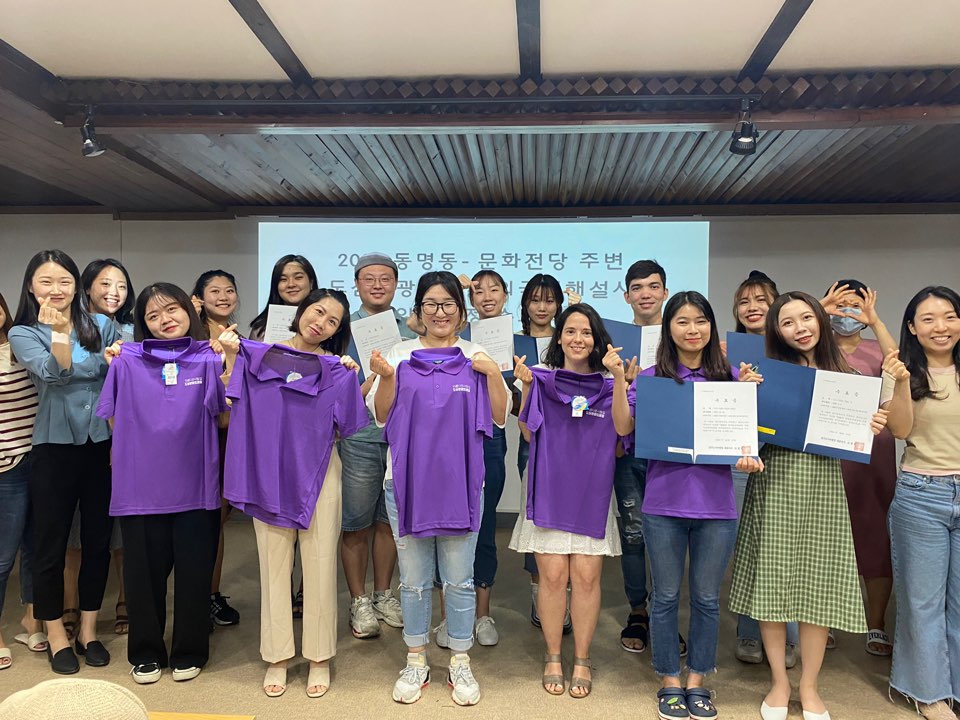
GN: What is the Gwangju Downtown Trail program all about? How does the program work?
Phi Phi Le: This is a very interesting program for foreigners living and studying in Gwangju. Via education in history, culture, and people, participants can later become local tour guides and contribute to attracting foreign visitors to the city.
GN: The program has participants from many countries. Where are some of the other participants from?
Phi Phi Le: There are four Vietnamese, and the others are mostly Chinese, Uzbek, Spanish, with one Kazakh. Though coming from many countries, we were divided into three groups. During this orientation experience, we talked to each other and gradually became closer to each other.
GN: I understand that there are several different trails people can follow. Where do these trails go?
Phi Phi Le: There are five different trails at present. They include the life of the famous poet Kim Hyun-seung, K-pop culture, Art Street, the Democratic Uprising of 1980 (5.18), and the life of the famous music composer Cheong Yul-Seong.
GN: Why did you decide to join the program? What exactly is your role?
Phi Phi Le: I was made aware of the program via my university friend (we both have a second major in tourism management). Via this program, I would like to get more experience and understand more about the city I am living in. Through this, I can obtain real experience that can be advantageous for my future career.
GN: This is a volunteer program. As a foreigner in Korea, why do you think it is important to volunteer in Gwangju?
Phi Phi Le: I think not only I but also all other students want to join volunteer programs. Through such programs, we get more experience, make new friendships, and become more mature.
GN: Is there anything you would like to add about the program?
Phi Phi Le: I came to Gwangju three years ago. Apart from going to school, my time is spent taking care of my two little sons. So, I have few opportunities to go out to many places or take part in volunteer programs. Thanks to this program, I have had many profound experiences and have learned interesting things about the culture and history of the city. These are things I can tell my sons when they grow older. If I have a chance later to become a tour guide for foreigners coming to the city, I would be proud!
THE INTERVIEWERS
William Urbanski is the managing editor of the Gwangju News and has an MA in international relations and cultural diplomacy. He is married to a wonderful Korean woman, always pays cash, and keeps all his receipts. Instagram: @will_il_gatto
Jeong Jiyeon studied piano in university and is now working as a coordinator at the Gwangju International Center. She spends her free time in bed with her best friends, Netflix and YouTube.


